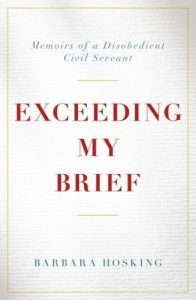 Memoirs of a Disobedient Civil Servant
Memoirs of a Disobedient Civil Servant
Published by Biteback Publishing 21 November 2017
384pp, hardback, £25
Reviewed by Jessica Mann
Many old people write their memoirs; few old people write memoirs that interest anyone outside their own family and friends. Ninety-one-year-old Barbara Hosking is unusual in this, as in almost every aspect of her long life. This autobiography is her first book, and it is a genuinely fascinating account of her remarkable life and career.
Barbara grew up in Penzance. Her parents ran a dairy but went bankrupt. Seeing her mother’s miserable poverty, ‘I resolved never to be in debt. I always pay my bills by return. I have always bought everything outright and still do.’ The war brought the family a better life, with their bullying father away and their mother doing a paid job, as billeting officer for evacuees.
Barbara won a scholarship to a local girls’ school, did brilliantly but left early to start earning. After mastering shorthand and typing, she got a job in the Isles of Scilly, as secretary to the town clerk, her wages supplemented by freelance journalism for a local newspaper.
In1946, aged twenty-one, Barbara went to London, found a bedsit and a typing pool job, and later work on a cinema chain’s house magazine. ‘I was a full time writer at last.’ Next came jobs with the Labour party at Transport House, in Tanganyika working in the office of a metal mine, then back to Transport House as Press Officer. She thought of standing for parliament, and was chosen as candidate for Stroud before realizing that ‘an MP’s life was not for me.’ So she became a civil servant and soon found herself inside 10 Downing Street, writing speeches for ‘clever, patriotic and kind’ Harold Wilson, and then for Edward Heath who was, Barbara thought, sincere and hard working but the victim of permanent bad luck. She got on well with both prime ministers, having disarmed Heath with cheekiness at a difficult meeting. ‘I’ve been bullied by bigger men than him, I thought. Nye Bevan for a start.’ So she refilled her glass, told him she thought he was wrong, and from then on they were friends. She even entertained the notoriously anti-social Heath to lunch at her club.
During her time in the Cabinet Office she was present at triumphs and tragedies: the signing of the Treaty of Rome, when Britain joined the Common Market, and the massacre at the 1972 Olympics.
When she retired from the Civil Service, Barbara became senior political adviser to the Independent Broadcasting Authority and then moved from public service into profit-making enterprises, as a board member of West Country TV.
Despite this impressive CV I think it is for her extra-curricular achievements that Barbara will be remembered. She never made any secret of being gay and, as a lifelong feminist, worked to get women into public life and to establish the International Women’s Forum in the UK. She was one of the first women members of a London ‘gentleman’s club’ – the Reform.
Barbara’s writing is in the straightforward, easy style of the best speech writers. She says nothing mean or catty, and is kind about nearly all the many people described or mentioned, her father being the principal exception. She has remained patriotically Cornish. In a speech made in Cornwall I remember her saying, ‘We Cornish are people of the edge. Women and men who are risk takers.’ Barbara Hosking took risks and won. Hers has been a triumphant life.
